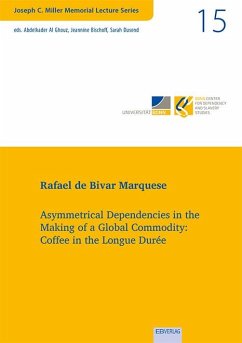The present-day patterns of coffee production and consumption are rooted in the legacies of colonialism and slavery, but surprisingly the global history of the relationships between this commodity and slavery and other forms of asymmetrical dependencies has not been written yet. In this short monograph, Rafael de Bivar Marquese presents a proposal on how to do so. In its first part, it argues that historically specific forms of asymmetrically dependent labor that were mobilized for coffee production from the mid-sixteenth century to the late nineteenth century can be better understood from how they were situated in three different, global coffee economies that overlapped in this longue durée. The monograph presents an overview of each, highlighting their main characteristics and in particular the relationships between different labor regimes within each one of them. In its second part, it discusses the three main theoretical and methodological axes that guide the proposal.








